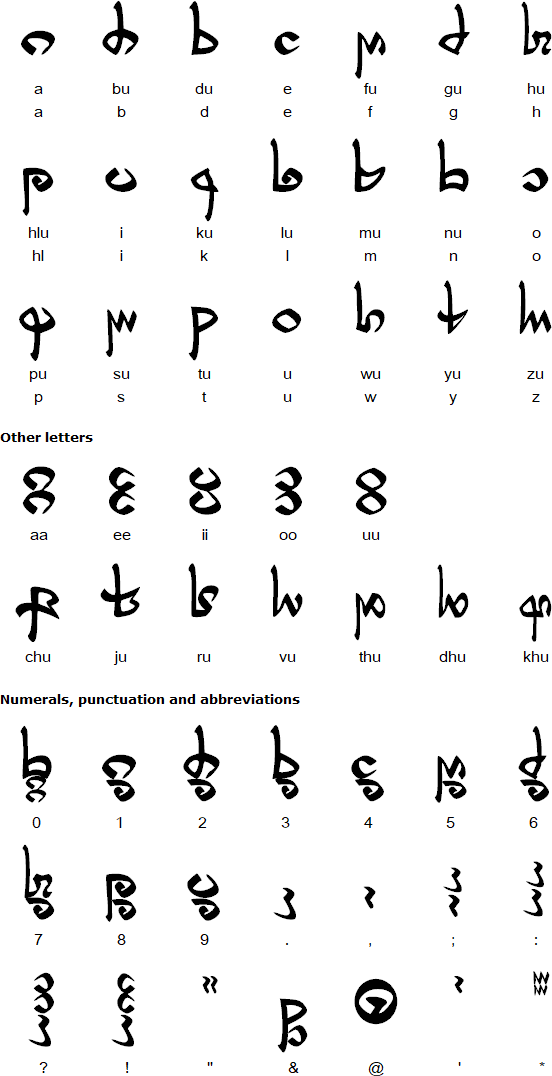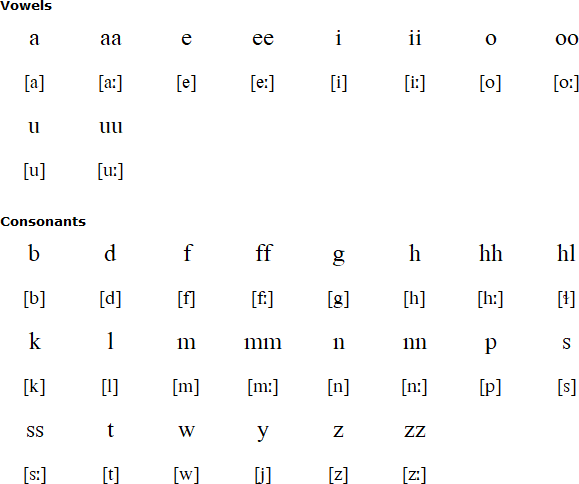
Laala is constructed language devised by Simon Ager, the creator of Omniglot, who was inspired to try creating a language after attending the Language Creation Conference in Horsham in 2015. The aim was to create a minimalist language with words based on sound symbolism and onomatopoeia as much as possible. The name Laala means 'speak speak' or 'talk talk'.
The sound system is somewhat reminiscent of Bantu languages such as Zulu, though without the clicks. Stress is usually on the first syllable, with secondary stress on other syllables with long vowels. Some expressions are distinguished by tone, e.g. m da (rising tone) = please, m da (falling tone) = thank you.
Laala can be written with the alphabet below, which was created by Simon Ager, or with the Latin alphabet.


Download an alphabet chart for Laala (includes the alphabet, phrases, numbers and a word list)
Laala is mainly an isolating language in which the role of words in a sentence is determined by their position. The word order is Verb Subject Object (VSO). For example, Ta do da = I see you / Hello ("See I you"), La do Laala = I speak Laala.
Tenses can be indicated with soni (now) for the present, and sone (then) for the past, and sozi for the future, or other time words. For example, La do Laala = I speak Laala, La do Laala soni = I speak Laala, La do Laala sone = I spoke Laala, La do Laala sozi = I will speak Laala. Verbs do not conjugate for person, tense or number.
Negatives are formed with na, e.g. Ta do da = I see you, Ta do na da = I don't see you.
| do | I, me, my, mine |
| da | you (sg), your, yours |
| de | he, him, his |
| di | she, her, hers |
| du | it, its, one |
| dodo | we, us, our |
| dada | you (pl), your, yours |
| dudu | they, them, their |
| wu | what |
| wufoha | why (what reason) |
| wuzeze | how (what way) |
| wuni | where (what place) |
| wuladu | who (what person) |
| wuso | when (what time) |
| wudu | which (what thing) |
There are 90 basic words, which are all single syllables. For example, sa = sun, si = moon, so = time, zi = come, ze = go. They can be combined together to form other words, e.g. sosa = day (time sun), sosi = night (time moon), zizesa = year (come go sun), and zizesi = month (come go moon).

Zizo kaki ladu wu fofekaki wo gegi, wo pa dudu fozomm wo fozodu. Pa dudu foha wo fota, wo m dudu zo m wawa.
Hear a recording of this text by Simon Ager
All human beings are born free and equal in dignity and rights. They
are endowed with reason and conscience and should act towards one another
in a spirit of brotherhood.
(Article 1 of the Universal Declaration of Human Rights)
Information about Laala | Phrases | Numbers | Family words | Time
Bocsys, Crymeddau, Curvetic, Fingers, Funemon, Kanadana, Geyinzi, Laala, Tengwar for Welsh
Constructed scripts for: Ainu | Arabic | Chinese languages | Dutch | English | Hawaiian | Hungarian | Japanese | Korean | Lingala | Malay & Indonesian | Persian | Tagalog / Filipino | Russian | Sanskrit | Spanish | Taino | Turkish | Vietnamese | Welsh | Other natural languages | Colour-based scripts | Tactile scripts | Phonetic/universal scripts | Constructed scripts for constructed languages | Adaptations of existing alphabets | Fictional alphabets | Magical alphabets | A-Z index | How to submit a constructed script
[top]
You can support this site by Buying Me A Coffee, and if you like what you see on this page, you can use the buttons below to share it with people you know.

If you like this site and find it useful, you can support it by making a donation via PayPal or Patreon, or by contributing in other ways. Omniglot is how I make my living.
Note: all links on this site to Amazon.com, Amazon.co.uk
and Amazon.fr
are affiliate links. This means I earn a commission if you click on any of them and buy something. So by clicking on these links you can help to support this site.
[top]